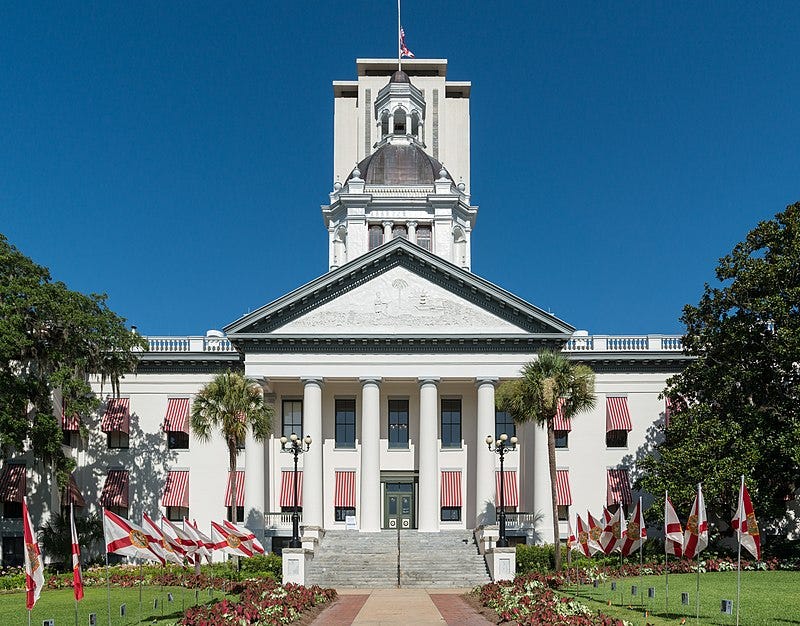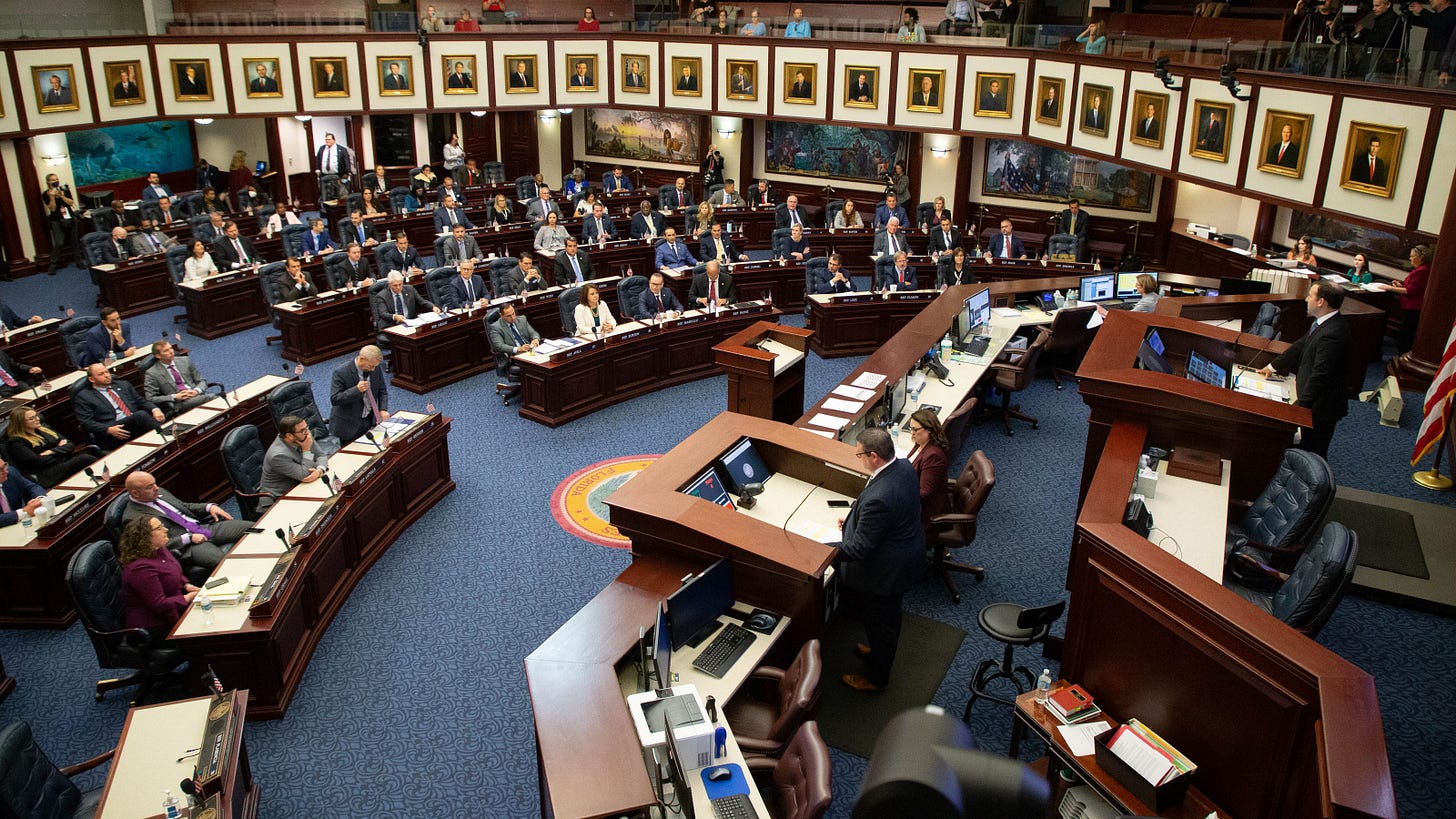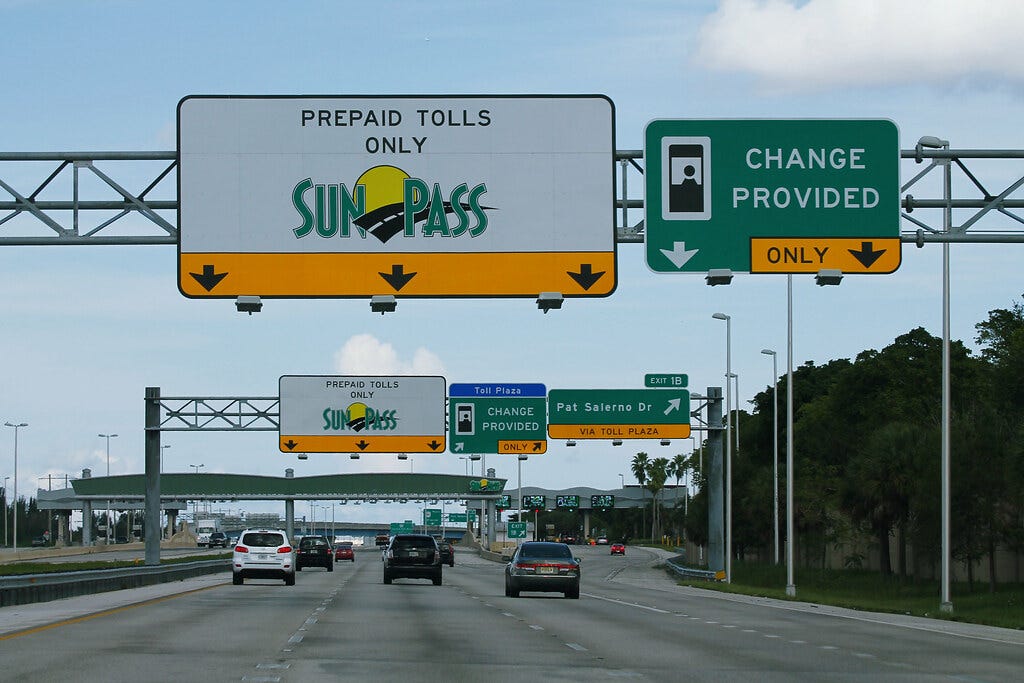Lawmakers pass changes to property insurance, hurricane relief, and toll fees, DeSantis seeks investigation of COVID-19 vaccines, and more...
December 16, 2022 — This Week's Top Stories in Florida
Welcome to this week’s edition of Floridian Today, a newsletter about all things Florida — from politics, business, real estate, and climate. Reporting from the Sunshine State, these are the most important stories you need to know. To never miss an update, subscribe here:
Here’s the latest from Florida…
Lawmakers pass legislation aimed at property insurance reforms, hurricane relief, and toll fees in special session
State lawmakers convened in Tallahassee this week to address Florida’s property insurance crisis in a special session called by Governor Ron DeSantis in October. This is the second special legislative session this year to take on the beleaguered property insurance industry as legislators work to stabilize the market amid an array of insurers declaring insolvency and skyrocketing premiums for homeowners. Earlier this week, a 123-page bill was filed that establishes a $1 billion reinsurance fund, aims to reduce insurance-related lawsuits, and reduces financial pressure on Citizen’s Insurance, the state-backed insurer of last resort. The current special session was called in response to the devastation left behind by Hurricane Ian in September that exacerbated ongoing problems within the state’s property insurance market. The state legislature expanded upon the reforms and policy changes agreed to during the special session held in May. In that session, lawmakers approved $2 billion in state-backed reinsurance that provides reimbursement to property insurers for hurricane losses beyond what the Florida Hurricane Catastrophe Fund provides, propping up companies to prevent them from becoming insolvent or abandoning business in Florida. On Wednesday, the Florida Legislature passed broad changes to troubled property insurance laws, hoping to deliver calm to the turbulent market. The special session also focused on providing property tax relief for victims of Hurricane Ian and reducing toll fees to commuters with 35 or more charges a month.
Florida Legislature approves fixes to property insurance laws
As Floridians pay the highest homeowners insurance premiums in the U.S. and property insurers have been declaring bankruptcy or withdrawing from the state altogether, lawmakers approved of an overhaul to insurance laws that aim to stabilize the market. Senate Bill 2A, creates a $1 billion taxpayer-funded program to lift insurers by offering reinsurance coverage that assists in paying out claims following a catastrophic natural disaster. The bill passed largely along party lines as Republicans leveraged their new-found supermajority power to dismiss every Democrat-proposed amendment. Republicans sought to lower property insurance rates on homeowners by reigning in fraud and litigation that have led to increased costs. Specifically, the changes will expedite the claims process and eliminate the problematic assignment of benefits law that has led to frivolous lawsuits by unscrupulous contractors. Additionally, the bill abolishes one-way attorney fees for property claims; the initial claims filing period is reduced from two years to one; allows the use of proposal for settlement in cases of multiple litigants; and reforms first-party bad faith law to put the onus on claimants to prove breach of policy before a claim can be made. Republicans say the changes will lead to lower rates by restricting lawsuit abuse that has forced insurance companies to pass on the high costs of litigation to consumers. Meanwhile, Democrats argue there is no guarantee in place to ensure premiums will be lowered for Floridians. The approved legislation reduces the incentive for attorneys to file unnecessary lawsuits against insurers with the hope of profiting from attorney fees, which ultimately drives up insurance premiums for ratepayers, has resulted in company insolvency, and driven an overwhelming number of homeowners to Citizens Property Insurance. Legislators also approved a provision in the bill that tightens eligibility requirements for homeowners seeking policies through Citizens Property Insurance. The approved changes mandate that people on Citizens would be forced to pay for flood insurance and be required to move to a private insurer if their policies are within 20% of the cost of their Citizens’ rates.
Lawmakers pass tax relief for victims of recent hurricanes
As reforms to the property insurance market were debated in Tallahassee during this week’s special session, lawmakers were also focused on providing aid to victims who faced devastation in the wake of Hurricanes Ian and Nicole. Senate Bill 4A, sponsored by Republican Senator Travis Hutson provides funding for Floridians and communities rebuilding after recent hurricanes caused tens of billions of dollars in damage to the state. The bill, passed unanimously by both the House and Senate, appropriates $751.5 million toward recovery efforts for hurricane victims by providing tax relief for homeowners, housing assistance for those displaced, and funding to help local governments obtain grants from FEMA. Hurricane victims will receive tax refunds for the portion of the year that their homes were deemed uninhabitable as a result of storm damage, while $150 million has been set aside for affordable housing recovery programs, including $60 million that will be appropriated to assist with home repairs or replacement, relocation expenses, or rental assistance. Of that sum, $25 million can be used for homeowners to cover insurance deductibles. Nearly half of the appropriated dollars will be allocated to the Division of Emergency Management (DEM) to provide 100% of funding match requirements for FEMA grants secured by local governments. Additionally, the legislation puts money toward beach renourishment and erosion projects as well as rebuilding essential water infrastructure impacted by Hurricanes Ian and Nicole. State economists estimate the tax refunds for homeowners to be $18.5 million and concentrated largely in Lee County.
Florida reduces toll fees for high-frequency commuters
Beyond changes to property insurance laws and providing relief to communities and victims impacted by recent hurricanes, Florida’s lawmakers also honed in on eliminating toll fees for commuters. Passed unanimously by both chambers of the legislature, Senate Bill 6A puts $500 million of taxpayer funds into establishing a toll relief program for commuters who frequently travel on turnpike highways. For the entirety of the 2023 calendar year, all toll road customers with two-axle vehicles in Florida will be eligible for a 50% credit if they accrue 35 or more toll transactions in a month. The bill reimburses the Florida Department of Transportation (FDOT) in the amount of $500 million of general revenue surplus for lost funding that is collected by toll agencies for road and bridge infrastructure projects. The relief is aimed at providing aid to motorists who frequently travel on toll roads as part of their daily commute and face inflationary pressures like higher fuel prices. Previously in August, Gov. Ron DeSantis signed a bill that gave motorists a 20 to 25% discount credit on their SunPass account after 40 or more toll transactions in a month. The six-month program went into effect on September 1.
Gov. DeSantis seeks investigation into manufacturers of COVID-19 vaccines
At a press conference in May 2021, DeSantis said to a gaggle of reporters and journalists, “my message is the vaccines protect you, get vaccinated, and then live your life as if you’re protected.” But now, the Republican governor and presidential prospect is reversing course on that message as he prepares to investigate COVID-19 vaccines and hold their manufacturers accountable. Gov. DeSantis has asked the Florida Supreme Court to give approval on an investigation of “any and all wrongdoing…with respect to COVID-19 vaccines,” including how the vaccines were publicized and marketed with respect to side effects. The petition filed with the Court requests a grand jury investigation into all individuals and organizations involved in the development, distribution, and marketing of the vaccines, putting the microscope on the scientists behind development and the medical associations behind their promotion. Beyond the petition filing, DeSantis also announced the creation of the Public Health Integrity Committee comprised of a panel of physicians, researchers, and health experts to evaluate federal public health recommendations and guidance related to COVID-19. The Committee’s decisions and recommendations would likely contrast with the CDC, NIH, and FDA, which the governor says are agencies “serving to advance narratives rather than do evidence-based medicine.” In past months, DeSantis and his appointed health advisors such as state Surgeon General Joseph Ladapo have propagated skepticism with the vaccine, its efficacy, and side effects like myocarditis. Cynicism over the vaccine has grown considerably, largely among conservatives, since they became widely available to the public in early 2021, and Florida is leading the push back against inoculations, especially for children. Despite being vaccinated and boosted himself, DeSantis has been forcefully opposed to vaccine mandates as he touts his own record of keeping the state “free” and supporting individuals’ right to make their own medical decisions.
State insurance commissioner quits as lawmakers approve reforms
Florida Insurance Commissioner David Altmaier abruptly announced his resignation one day after the Legislature made sweeping reforms to the property insurance market in crisis. As the state’s chief insurance regulator, he oversees licensing, market conduct, premium financing, the approval of insurer rate filings, conducts investigations, and has the authority to deem an insurance provider as “insolvent.” The timing of Altmaier’s resignation is suspect in the immediate aftermath of the special session called to address the property insurance crisis. In his resignation letter submitted to the governor’s office, the Commissioner did not mention the reason for his departure or whether he took another role elsewhere. Insiders on Capitol Hill say Altmaier is stepping down before a new law takes effect on January 1 that would restrict officials at regulatory agencies from engaging in lobbying for at least six years. By resigning before the new law takes effect in a couple weeks, he would only be restricted from engaging in lobbying activities for two years. During his six-year tenure as Commissioner of the Florida Office of Insurance Regulation (OIR), Altmaier received high marks and praise, including from Gov. DeSantis. “Since the Governor took office, Commissioner Altmaier has been instrumental in helping to pass and implement major property insurance reforms to bring relief to Floridians,” a DeSantis spokesperson said in a statement. However, some Democrats criticized the commissioner for not taking proactive steps to regulate insurers and reign in skyrocketing premiums. His term in the role saw many insurers declare insolvency, dozens of others withdraw from the state, and as OIR chief, he approved numerous rate increase requests by insurance companies, raising premiums for policyholders. However, Altmaier endorsed the recent legislation approved by lawmakers that established insurance market reforms, seeing it as necessary to lower homeowners’ premiums. Altmaier’s last day is December 28.
Citrus industry faces the worst year since the Great Depression
In an October edition of Floridian Today, we reported that citrus crop forecasts predicted a dismal year ahead, adding to the two decades of continuous production declines. Citrus greening disease and natural disasters have led to diminishing crop yields, but now we know just how severe of an impact these factors have had on the citrus industry in the upcoming year. The current growing season, which begins in October, is expected to be the worst since the Great Depression, producing just 20 million boxes of oranges, according to the U.S. Department of Agriculture’s recent report. This is an 8 million drop below previous USDA forecasts. The estimates for Florida’s orange crop fell another 29% after Hurricane Ian and Nicole destroyed groves across the state, including in the top citrus-producing counties of Polk, DeSoto, Highlands, Hendry, and Hardee. These counties accounted for 72% of total citrus production in Florida during the 2020-21 growing season and were in the direct path of category 4 Ian in late September. Cost estimates for the damages to the industry were pegged at between $146.9 million and $304.3 million by the University of Florida and as high as $675 million by the Florida Department of Agriculture. The forecast for the 2022-23 growing season is nearly 50% lower than production in 2021-22, which was already experiencing record lows. Production for grapefruit and other specialty fruits (e.g. tangerines, tangelos, etc.) has also dropped 10% and 14%, respectively.
Unclaimed property in the state totals $2.5 billion
One in five Floridians has unclaimed property or assets from a financial account, according to the Department of Financial Services (DFS). In fact, the total of unclaimed financial assets that have been left lost tops $2.5 billion, mostly from accounts at financial institutions that have been dormant and forgotten by its owner. To help Floridians reclaim their unclaimed money, Chief Financial Officer Jimmy Patronis has launched the “Florida Treasure Hunt” website to allow individuals to initiate a claims process and supply documentation to retrieve their property. The website, FLTreasureHunt.gov, features a searchable database in which users can enter their first and last name, or business/company name and claim financial property that is rightfully theirs. According to DFS, the most common forms of unclaimed property are “dormant bank accounts, unclaimed insurance proceeds, stocks, dividends, uncashed checks, deposits, credit balances, and refunds.” Unclaimed property can include belongings from safe deposit boxes at banks that have been left abandoned. When property assets or dollars held by a business or government entity go unclaimed, efforts are made to contact their owner and return the asset, but when that fails, it is reported and sent to the state Department of Financial Services, Division of Unclaimed Property. Unclaimed money in DFS’ possession is deposited into the state’s school fund to be used for public education until claimed. Owners can claim their property anytime at no cost. In 2021, $388 million was returned to Floridians, a fraction of the total $2.5 billion left unclaimed. A November 2022 report by the state’s CFO that show cities with the most unclaimed funds and assets, featured Miami and Orlando at the top of the list at $4.8 million and $3.8 million left behind, respectively.
Thanks for reading this edition of Floridian Today. To never miss an update, subscribe for free:
In the meantime, if you learned something or found this read interesting, please consider sharing it to grow our community!










